
Available on: iOS, Android and BlackBerry OS
Reviewed on: iPad
Price: Free
Introduction:
Apple products are most often beautifully designed, work seamlessly and are very intuitive, but the syncing process with iTunes is nightmarish more often than not, a problem compounded by the fact that iOS does not have a built in file-system. Enter Dropbox, the cloud based storage service helps reduce some of these issues through its app. It does, at least, solve the file transfer part of the problem. But Dropbox is more than just a cloud based file transfer app as you will discover as you keep reading.
Usability:
The Dropbox app on the iOS syncs with the native browser based interface or the Windows/Mac app. You can create folders and even share particular folders with otherDropbox users.
If one has a Windows/Mac app, sharing files with the iOS counterpart is very seamless as the Windows/Mac app creates a folder on the machine and all one has to do is drag and drop files.
User interface-wise, Dropbox can't be simpler as the iOS app is divided into two panes. On the left hand, it displays all the files and folders. On the right hand, we have a preview window which previews files of various formats, be it Mp3, Word, PowerPoint or PDF. So, those people who do not have an in-built document viewer of the 'iWork' or 'Documents 2 Go' sort, can at least view their files. Unfortunately, there are no editing options yet. You can even stream your Mp3 files on your iOS device without actually having the file on the device.
Dropbox even offers us an option to directly e-mail the file and choose an application with which to open it, provided the file has multiple apps that support it. This is one feature we have always wanted, as, by and large, top open a concerned file meant selecting the specific app in iTunes.
Dropbox offers free cloud storage of up-to 2GB, which can get upgraded, to 2.25 Gb if one recommends the app to other people and download a variety of different files. One can upgrade to 50 Gb of storage for $9.99/month or $99/ year or go a notch higher with 100 Gb of storage for $19.99/month and $199.99/ year.
Dropbox also has sister BlackBerry and Android apps, which offer similar functionality but are not as intuitive.
Verdict:
With the addition of Dropbox, your iPad or iPhone truly turns into a workhorse. Transferring files is a painless process and it allows us to choose which app we would like to open a particular document with, aside from being a document viewer in itself.
As it is a cloud-based service, it has its inherent bandwidth limitations and will not work without connectivity but if one has these facilities it works fabulously. A flaw is the limited storage space offered, as a 2GB limit isnot enough for videos, but then again it's free and one can always pay for more storage.
Dropbox is among the must have apps for the iOS platform, especially for someone who intends to use an iPad as a netbook replacement.
Rating:
Usability - 5
Price - 5
Wow factor - 4.5
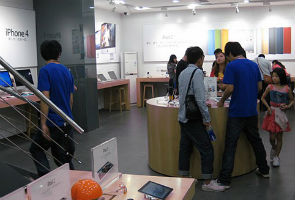
Chinese officials have found five fake Apple stores in the southwestern city of Kunming, and ordered two of them to suspend business while they're investigated, a local government website said Monday.
Officials couldn't do anything about the other three stores - which prominently displayed Apple signs and logos - because they did not find any fake Apple products for sale, according to a report by a local newspaper posted on the Kunming city government's website.
The investigation follows a blog post last week by an American woman who lives in Kunming in Yunnan province, who stumbled across three shops masquerading as bona fide Apple stores in the city. She took photos and posted them on her BirdAbroad blog.
She said they were modeled on the company's iconic stores right down to the winding staircase and the staff wearing the customary blue T-shirts.
After the blog appeared on Wednesday, the Kunming Trade and Industry Bureau inspected more than 300 electronics stores in Kunming and found the five fake Apple stores, the city government's website said.
Calls to the Kunming Trade and Industry Bureau rang unanswered Monday.
The maker of the iPhone and other hit gadgets has four company stores in China - two in Beijing and two in Shanghai - and various official resellers.
The proliferation of the fake stores underlines the slow progress that China's government is making in countering a culture of a rampant piracy and widespread production of bogus goods that is a major irritant in relations with trading partners.
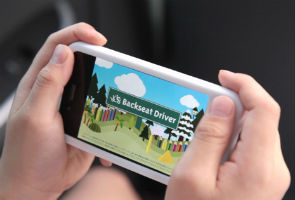
A new iPhone app called Backseat Driver permits kids to enjoy a virtual drive linked to the real journey via GPS.
Players chase the 'Papa Car', the real driver, in their own vehicle along a route similar to that which they are really moving along.
The app uses satellite positioning and creates a road layout with a similar number of twists and turns. Children steer to the left or the right by tilting their phone and earn extra points for driving well.
The game could prove a valuable tool for parents with children who are bored on long journeys with nothing to do, the Daily Mail reports.
But it could also be handy for relatives who insist on driving from the backseat even when it annoys the person behind the wheel.
In Backseat Driver, the Papa Car drops various objects which are linked to landmarks and shops taken from real life buildings which are driven past.
Players collect the objects and save them to view information about the locations later. Points collected can be used to modify the car with a different colour or better engine.
The game allows users to share their routes via social networking sites like Facebook and Twitter and compete in an online league table of how far they have travelled.
A promotional video for the app shows a family driving around Tokyo with their daughter in the back seat - turning her iPhone at the same time her father turns the steering wheel.
The voiceover says it is 'the world's first application that you can enjoy driving from the back seat of your car'.
Backseat Driver is free to download from the iTunes store from ToyToyota, an offshoot of the car manufacturer Toyota.
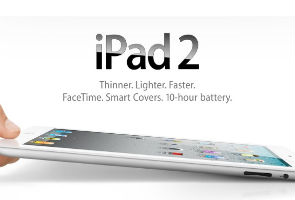
A list of must-have gizmos you need to stay in touch, tune and time
You can get a gadget for practically everything out there. From an HD POV camera and an arcade game table, to a camera that's tough enough to withstand 220 pounds of pressure. But do you really need any of those? Not for day-to-day life, for sure. But here are five must-haves.
The Desktop
Many would advocate that laptops are the way to go. But for a real man? We think not. Size does matter. Why confine Photoshop to a 13-inch screen, when you can edit your photos on the glorious 27-inch screen of the iMac, along with Apple's Magic Trackpad, which is 80 percent larger than the one found on a MacBook. Or you could opt for the quad-core HP Touchsmart 610, where your entire screen is one big 23-inch, high-def trackpad.
GQ Picks: The 27" iMac
The Tablet
Whichever one you choose, you should know that a good tablet can keep you entertained no matter where you are. Perhaps it's too early for them to replace newspapers in the john, but the tablet (iPad 2, Xoom, PlayBook, take your pick) is waiting to revolutionise the way you read, watch and even work.
GQ Picks: The iPad 2 (for now)
The Smartphone
It might seem strange to you, dear Wi-Fi enabled reader, but some men don't own smartphones. It's hardly a new phenomenon, but the battle lines are getting clearer, and those not in possession have been found lacking in combat. These days, being caught without a Wi-Fi and 3G enabled, dual-core packing, multitasking capable device is like being a fisherman without a boat; you can do your job, but the possibilities are kinda limited.
GQ Picks: Motorola Atrix (One of its accessories turns it into a netbook!)
The Console
Every man needs a place where he can even the score. Enter: the PS3. We'll take our revenge on the boss in the comfort of our homes, while blowing away enemy forces in the exclusive to PS3 title: Killzone 3. Or don Superman's cape and kick some superhero ass in the MMORPG (Massively Multiplayer Online Role Playing Game, for n00bs) DC Universe Online.
GQ Picks: You need to ask?
The LED TV
Twenty-one inches just don't cut it anymore. Neither does a TV that doesn't look magnificent even when switched off, or offer full HD viewing when on. LCD TVs are old, and Plasma TVs are practically ancient. LED is definitely the way to go for a true connoisseur of the visual arts. Plus, they're undeniably cool. To fully appreciate these high-priced, high-def beauties, pair them with a Blu-ray player (aka, your PS3), or an HD DTH box, and you'll literally make a long-lasting impression on your couch.
Our Pick: Samsung's UA55C8000XR (All three Ds: LED, HD and 3D)
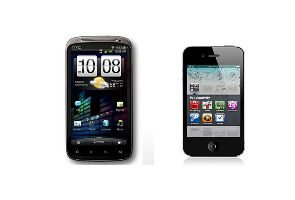
The pace of innovation and change in mobile devices is so dizzying it is difficult to predict the winning platforms and products of the next few years.
With that caveat, a panel of technology executives and experts nevertheless took out their crystal balls on Wednesday at the Fortune Brainstorm Tech conference in this Colorado resort to take a glimpse into the mobile future.
Before an audience of movers and shakers from Silicon Valley and elsewhere, they looked at trends among smartphones and the fast-growing market for tablet computers pioneered by Apple's iPad.
"I'd say that whatever we can imagine in this room right now will be possible in five years," said George Colony, founder and chief executive of technology and market research company Forrester.
"Everyone will have smartphones within four years, all over the world, it'll be so cheap," Colony said. "By 2014 we believe that one-third of Americans will own a tablet."
Frank Meehan, founder of handset maker INQ Mobile, repeatedly brought up the futuristic Steven Spielberg film "Minority Report" to describe the possibilities on the horizon for mobile devices.
In the 2002 film, star Tom Cruise notably moves pictures, documents and video around on an interactive screen at lightning speed using just hand motions.
Colony traced the evolution of the user interface for mobile devices to the current touchscreen technology popularized by the iPhone and iPad and pondered what might come next.
"Microsoft could take the Kinect technology and that could be the next big change," he said of the motion-sensing XBox 360 game controller from the US software giant.
"If you look back at over 30 years of tech, all of the big changes have come through changes in user interface," Colony said. "Always look to user interface if you want to understand where the thunderstorm will be."
Stephen Hoover, chief executive of PARC, Xerox's legendary research and development unit, said next-generation mobile capability will involve the seamless "integration of the physical and digital worlds."
Mobile devices will be able to provide "the information that's most relevant to me now, physically where I am, and in the context of what I'm trying to do," Hoover said.
"We're at the cusp of really being able to integrate all of these different sources of data and understand people's intention in context and give them the information that's useful at the time they need it," he said.
Todd Bradley, executive vice president of US computer giant Hewlett-Packard, agreed and said mobile devices will possess an ability to deliver what he called a "ubiquitous experience."
He spoke of "the ubiquity of a device that knows I'm at Starbucks and that I read The New York Times when I'm at Starbucks."
The US coffee chain is already allowing patrons in the United States to pay for their lattes with mobile phones, and the Fortune Brainstorm panelists said they expect huge growth over the coming years in mobile payments.
"I actually wonder if the lead in mobile isn't going to come from Asia," said Meehan. "In China, in India, in Indonesia the mobile operator is your source of cash."
Hoover said the increasingly powerful cameras built into mobile phones and tablets will provide all sorts of other opportunities.
"You look at the quality of the cameras today in the device and the power that they have and there's a lot of things you can do with scene recognition," he said.
"I hold up a camera to the sign of the restaurant and get recommendations," Hoover said. "We have that technology today, it's about putting it together."
A new iPad application will help doctors in delivering the appropriate treatment at the right place and time.
Known as Diagnostic Imaging Pathways (DIP), the tool has been developed by the Centre for Software Practice (CSP) with the Royal Perth Hospital, under Professor Richard Mendelson from the University of Western Australia.
"Thirty percent of imaging requests are incorrect or inappropriate - the iPad application DiPHD will help make sure that patients have the best chance of getting the most accurate diagnosis," Mendelson said, according to a CSP statement.
Having the pathways available on a platform like the iPad ensures that doctors will be able to access vital information, literally at their fingertips, said CSP director associate professor David Glance.
"Imaging is the first step in future pathways that will also involve pathology and clinical referral guidelines," Glance said.

China's passion for iPads and iPhones has triggered widespread cloning and even brawls. Now, it has gone further with a fake Apple store so convincing even the staff think they work for Steve Jobs.
The store, in the southwestern city of Kunming, was uncovered by an American blogger who was initially fooled, before she noticed not everything was as it seemed.
At first glance, the signs, computers and layout of the shop all look exactly like a genuine Apple store, says the blogger, who posts under the name BirdAbroad.
Photos posted by the blogger show the employees wearing Apple's trademark blue T-shirts with name badges hanging around their necks.
But a closer look reveals the winding stairs going up to the chill-out area are poorly made, the walls have not been painted well, and the shopfront sign says "Apple Store" whereas the real deal just sports the now-famous fruit logo.
The employees, meanwhile, all genuinely believe they work for Apple, said BirdAbroad, who asked to remain anonymous when contacted by AFP on Thursday.
"I do not know if the computers were real or fake -- they seemed real, but it can be hard to tell," she said. "As of last night, the store was still open."
She added that a quick walk around the corner revealed two other rip-off Apple stores -- one of which sported a sign saying "Apple Stoer".
The Apple website lists four official stores in China -- two in Beijing and two in Shanghai, and none in Kunming.
It has a list of approved retailers that sell its products, but none of those in Kunming corresponds to the fake store's address, according to the blogger.
A spokeswoman for Apple China declined to comment when contacted by AFP.
China is home to the biggest counterfeit market in the world, and despite repeated government pledges to root out fake goods, these are still widely available throughout the country.
As the craze for all things Apple slowly spreads around China, fake iPhones and iPods have also emerged.
The news, however, is unlikely to have an impact on the US-based IT giant, which on Tuesday posted record sales and profits in the recent quarter as sales of iPhones and iPads more than doubled, helped by huge demand in Asia.
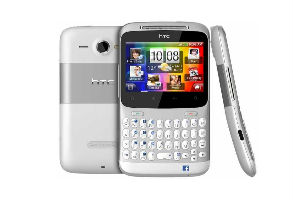
HTC and Tata DOCOMO, have announced the HTC ChaCha in India for Rs. 15,990. The HTC ChaCha features a dedicated Facebook button that allows users to share just about anything with a single touch. The one-touch access to Facebook service has been integrated throughout the HTC Sense experience. HTC Sense is HTC's proprietary skin over the Android operating system running on the device.
The Facebook integration with the smartphone lets users easily upload images clicked from the smartphone. The Facebook sync with the devices calendar also helps you keep track of your friends' birthdays. Users can also receive notifications about which of their friends are online for chat.
The HTC ChaCha has a 2.6-inch display with a resolution of 480x320 pixels and a QWERTY keypad. The dedicated Facebook button rests below the keypad. It has an 800 MHz processor, 512MB of RAM, 512MB of ROM and expandable memory upto 32GB via Micro SD card. It has a 5MP autofocus rear camera with an LED flash and a front facing VGA camera for video conferencing. The device runs on Android's latest Gingerbread OS and is skinned with HTC Sense. The device supports HSPDA network, Wi-Fi, Bluetooth, 3.5 mm audio jack and a 1250 mAh battery.
Special data plans will come with the phone for Tata DOCOMO prepaid and postpaid customers.

South Korea's Samsung Electronics launched a new version of its Galaxy Tab in its home market Wednesday in a bid to lure consumers away from Apple's iPad.
The release comes as the South Korean firm is in embroiled in a patent dispute with US giant Apple, which has seen both sides file infringement claims against the other.
Samsung, the world's second-largest mobile phone maker, also said it would in August launch an updated version of its Galaxy S smartphone in the US market, which is dominated by Apple's iPhone.
The company has already released its Galaxy Tab 10.1 in five overseas countries including the United States.
The tab, powered by Android's Honeycomb 3.1 developed for tablet PCs, features a 10.1-inch (25.6 cm) touchscreen display rather than the seven-inch display for the previous model.
It is the world's thinnest tablet, measuring 8.6 millimetres, Samsung said. The price will start at 671,000 won ($634) in the home market.
Samsung said the seven-inch tab was optimised for portability, while the Galaxy Tab 10.1 was best suited for multimedia consumption and web browsing.
"It is very thin... and weighs just as much as a cup of takeout coffee," the company said in a statement.
The patent tussle between Samsung and Apple began in April when Apple filed a suit accusing South Korean firm of copying its smartphones and tablet computers. Samsung responded with a claim in Seoul alleging five patent infringements by Apple.
The California-based firm last month lodged a second lawsuit against Samsung with a district court in Seoul, asking for a sales ban on Samsung's latest products.
The US company escalated the row this month by asking the US International Trade Commission to block imports to the United States of some of the Samsung's smartphones and tablet computers.

Shares of BlackBerry maker Research In Motion (RIM) slipped to almost $25 on Monday after rumours that the Canadian wireless giant is planning to discontinue its WiFi-only PlayBook tablet.
Launched in April, the first BlackBerry tablet has failed to make its presence felt in the tablet market, leave alone challenge the leader iPad from Apple. The RIM tablet sold just 500,000 units in the first six weeks of its launch, compared to one million iPads sold by Apple within the first month of its launch April 2010.
RIM on Monday dismissed reports about stopping the production of the PlayBook, calling them "pure fiction".
In a statement to the Canadian media, the Waterloo-based company said, "Over the past month, the PlayBook has launched in 16 additional markets around the world and further rollouts are planned for Southeast Asia, Western Europe and the Middle East in the coming weeks.''
The BlackBerry tablet has been trashed as it cannot connect to the internet over next-generation cellular network. A user cannot access email and content unless unless he is a BlackBerry subscriber because only then can he tether it to his smart phone via BlackBerry Bridge software.
RIM has promised 4G PlayBooks later this summer. Apple also offers three WiFi-only as well as WiFi+3G iPads.
WiFi-only models are good for consumers as they cost less but carriers prefer to support cellular-equipped tablets as they earn additional revenue by selling monthly data plans.
Despite RIM's denial about stopping production of the PlayBook, analysts said RIM could possibly do that as it is now more focussed on its new line-up of BlackBerry smart phones to be unveiled later this year.
Its new smart phone line-up will run on the BlackBerry 7 Operating System unveiled last year. But from next year, all BlackBerry smart phones - as well as 4G tablets - will use the powerful QNX operating system.
The PlayBook tablet is the first RIM product to run on the QNX operating system.
At its last week's annual shareholder meeting, BlackBerry co-CEOs Mike Lazaridis and Jim Balsillie announced seven new BlackBerry smart phones in the coming months.







